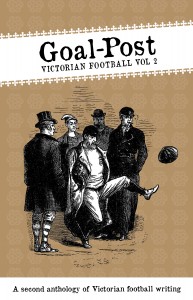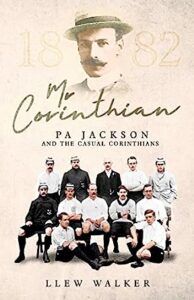 Back in September 2012, Paul Brown published his first anthology of Victorian Football writing and its success (and also that of The Victorian Football Miscellany), has ensured the recent issuing of a second volume of journalism from the 19th century.
Back in September 2012, Paul Brown published his first anthology of Victorian Football writing and its success (and also that of The Victorian Football Miscellany), has ensured the recent issuing of a second volume of journalism from the 19th century.
The book is comprised of twenty one articles which date wise range from 1862 through to 1899. Contained within are pieces which include match reports such as the first FA Cup held in 1872 between Wanderers and Royal Engineers and a later Final from 1883 when Blackburn Olympic beat Old Etonians 2-1 “…a watershed result – the previously dominant public school old boys’ never won the cup again…” as well as an 1862 game between Sheffield and Hallam.
In addition there are a number of articles which look at how the game was expanding and which when read now, are thought-provoking to see in a modern context. For instance the piece written by England cricket and football international C. B. Fry, explores the sports in 1895 and their respective position and relationship. It makes interesting reading especially when set against the modern era of football (in the guise of the Premier League) and the recent rise of the England cricket team. Another article which makes for debate is that concerning the furore associated with the 1881 England v Scotland “…match by women in Edinburgh…” which was described as a game “…of the most primitive order…”; 132 years later the BBC has in recent weeks shown live two of England women’s World Cup qualifiers – what would a time travelling Victorian football journalist have made of it! Another significant extract is titled The Association Game that is taken from the “…influential 1887 text ‘Athletics and Football’…” by Sir Montague Shearman which looks at such areas as the development of tactics.
However, the writing is not all of a serious or heavy nature and there is a good helping of Victorian humour and the bizarre. In the comedy corner are two articles, the first A Little Game of Football from the Sporting Gazette of December 1864, with the second from Chums (October 1893) entitled the Trials and Troubles of a Football Secretary. As for the strange, the anthology presents the reader with reports of a contest between Sheffield Players and Zulus, held to raise funds for the families of those killed in the Anglo-Zulu War and an article from 1899 detailing a game between Clowns and Elephants (yes, you’ve not misread that).
As with Volume 1, this collection of Victorian writing provides the reader with a unique range of ‘food for thought’. The article which was my standout was that from R.G. Graham titled The Early History of the Football Association from 1899. The interest for me lay in the early rules which reflect the games early derivation from rugby and the clubs (many of which no longer exist), who were then members of the Football Association. It’s football gentlemen, but not as we know it…
 Mr Corinthian is the first-ever biography of Nicholas Lane (‘Pa’) Jackson, founding father of the famous Corinthian Football Club.
Mr Corinthian is the first-ever biography of Nicholas Lane (‘Pa’) Jackson, founding father of the famous Corinthian Football Club. Back in September 2012, Paul Brown published his
Back in September 2012, Paul Brown published his